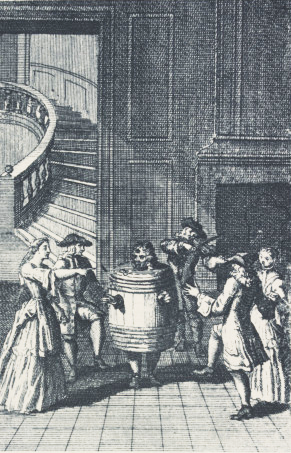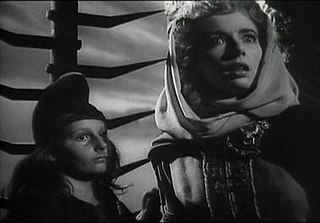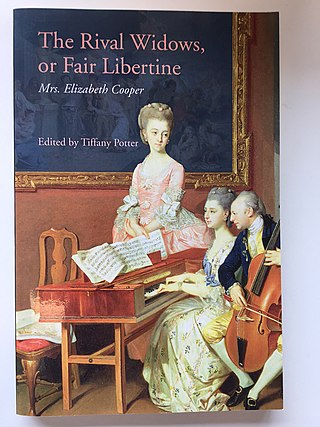Related Research Articles

"Restoration comedy" is English comedy written and performed in the Restoration period of 1660–1710. Comedy of manners is used as a synonym for this. After public stage performances were banned for 18 years by the Puritan regime, reopening of the theatres in 1660 marked a renaissance of English drama. Sexually explicit language was encouraged by King Charles II (1660–1685) personally and by the rakish style of his court. Historian George Norman Clark argues:
The best-known fact about the Restoration drama is that it is immoral. The dramatists did not criticize the accepted morality about gambling, drink, love, and pleasure generally, or try, like the dramatists of our own time, to work out their own view of character and conduct. What they did was, according to their respective inclinations, to mock at all restraints. Some were gross, others delicately improper.... The dramatists did not merely say anything they liked: they also intended to glory in it and to shock those who did not like it.

Sir William Davenant, also spelled D'Avenant, was an English poet and playwright. Along with Thomas Killigrew, Davenant was one of the rare figures in English Renaissance theatre whose career spanned both the Caroline and Restoration eras and who was active both before and after the English Civil War and during the Interregnum.

Philip Massinger was an English dramatist. His finely plotted plays, including A New Way to Pay Old Debts, The City Madam, and The Roman Actor, are noted for their satire and realism, and their political and social themes.

The School for Scandal is a comedy of manners written by Richard Brinsley Sheridan. It was first performed in London at Drury Lane Theatre on 8 May 1777.
Sir Henry Herbert was Master of the Revels to both King Charles I and King Charles II, as well as a politician during both reigns.

Thomas Betterton, the leading male actor and theatre manager during Restoration England, son of an under-cook to King Charles I, was born in London.

Thomas Killigrew was an English dramatist and theatre manager. He was a witty, dissolute figure at the court of King Charles II of England.

A New Way to Pay Old Debts is an English Renaissance drama, the most popular play by Philip Massinger. Its central character, Sir Giles Over-reach, became one of the more popular villains on English and American stages through the 19th century.

Sir Andrew Aguecheek is a fictional character in William Shakespeare's play Twelfth Night, or What You Will. One of the supporting characters, Sir Andrew is a stereotypical fool, who is goaded into unwisely duelling with Cesario and who is slowly having his money pilfered by Sir Toby Belch. He is dim-witted, vain and clownish. His role in the play not only provides comedy through his pathetic situation and his long speech, but also by his distinct, long-faced appearance and garish dress sense. The role has been a favourite for actors and has been performed by Alec Guinness, Christopher Plummer, Paul Scofield and Roger Rees.

Lady Macduff is a character in William Shakespeare's Macbeth. She is married to Lord Macduff, the Thane of Fife. Her appearance in the play is brief: she and her son are introduced in Act IV Scene II, a climactic scene that ends with both of them being murdered on Macbeth's orders. Though Lady Macduff's appearance is limited to this scene, her role in the play is quite significant. Later playwrights, William Davenant especially, expanded her role in adaptation and in performance.

John Warburton (1682–1759) was an antiquarian, cartographer, and Somerset Herald of Arms in Ordinary at the College of Arms in the early 18th century.
The Platonick Lovers is a Caroline era stage play which blends the genres of tragicomedy, satire, and comedy of manners. It was written by Sir William Davenant and first printed in 1636. The play can be regarded as one of the more subtle and successful satires in the English language: Davenant managed to ridicule the obsession of his employer without losing his job.
The Court Beggar is a Caroline era stage play written by Richard Brome. It was first performed by the acting company known as Beeston's Boys at the Cockpit Theatre. It has sometimes been identified as the seditious play, performed at the Cockpit in May 1640, which the Master of the Revels moved to have suppressed. However, the play's most recent editor, Marion O'Connor, dates it to "no earlier than the end of November 1640, and perhaps in the first months of 1641".
Wit at Several Weapons is a seventeenth-century comedy of uncertain date and authorship.
Wit Without Money is a Jacobean era stage play, a comedy written by John Fletcher, and first published in 1639.

The Duke's Company was a theatre company chartered by King Charles II at the start of the Restoration era, 1660. Sir William Davenant was manager of the company under the patronage of Prince James, Duke of York. During that period, theatres began to flourish again after they had been closed from the restrictions throughout the English Civil War and the Interregnum. The Duke's Company existed from 1660 to 1682, when it merged with the King's Company to form the United Company.
The Virtuoso is a Restoration comedy by Thomas Shadwell, first produced at Dorset Garden Theatre in 1676 by The Duke's Company. Well received in its original production, it was revived several times over the next thirty years and "always found Success." The original cast included Anthony Leigh as Sir Formal Trifle, Cave Underhill as Sir Samuel Hearty, Thomas Betterton as Longvill, Thomas Jevon as Hazard, Thomas Percival as Sir Nicholas Gimcrack, Anne Shadwell as Lady Gimcrack, Elizabeth Currer as Clarinda and Mary Betterton as Miranda.

Love for Love is a Restoration comedy written by English playwright William Congreve. It premiered on 30 April 1695 at the Lincoln's Inn Fields Theatre. Staged by Thomas Betterton's company the original cast included Betterton as Valentine, William Smith as Scandal, John Bowman as Tattle, Thomas Doggett as Ben, Samuel Sandford as Foresight, William Bowen as Jeremy, John Freeman as Buckram, Anne Bracegirdle as Angelica, Elizabeth Bowman as Mrs Foresight, Elizabeth Barry as Mrs Frail, Elinor Leigh as Nurse and Abigail Lawson as Jenny.

Sir John Eyre (1580–1639), initially of Great Chalfield Manor, Wiltshire and later of St. Giles-in-the-Fields, Middlesex was an English courtier, ambassador and Member of Parliament.

The Rival Widows, or the Fair Libertine is a 1735 comedy play by the British writer Elizabeth Cooper. The plot is a re-gendered mashup of two popular eighteenth-century genres: the libertine comedy and the comedy of sentiment. It is a comedic work that revolves around a complex web of romantic entanglements, misunderstandings, and schemes.
References
- ↑ Michael V. DePorte, in: The Later Jacobean and Caroline Dramatists: A Survey and Bibliography of Recent Studies in English Renaissance Drama, Terence P. Logan and Denzell S. Smith, eds., Lincoln, NE, University of Nebraska Press, 1978; pp. 198.
- ↑ Joseph Quincy Adams, Jr., ed., The Dramatic Records of Sir Henry Herbert, New Haven, 1917; reprinted New York, Benjamin Blom, 1963; pp. 22, 59.
- ↑ Deborah C. Payne, "Patronage and the Dramatic Marketplace under Charles I and II," Yearbook of English Studies, Vol. 21 Special Number (1991), pp. 137–52.
- ↑ Howard S. Collins, quoted in Logan and Smith, p. 198.